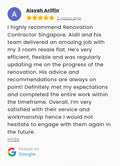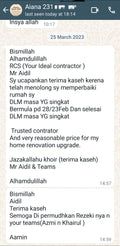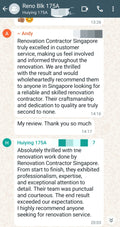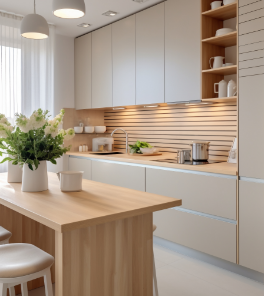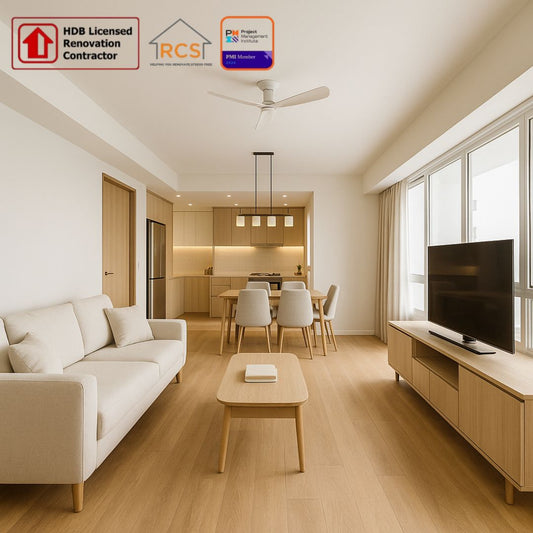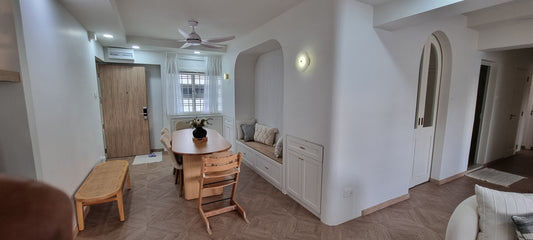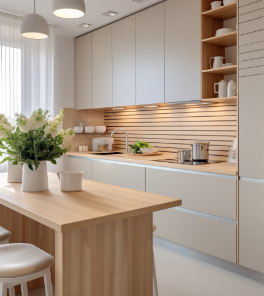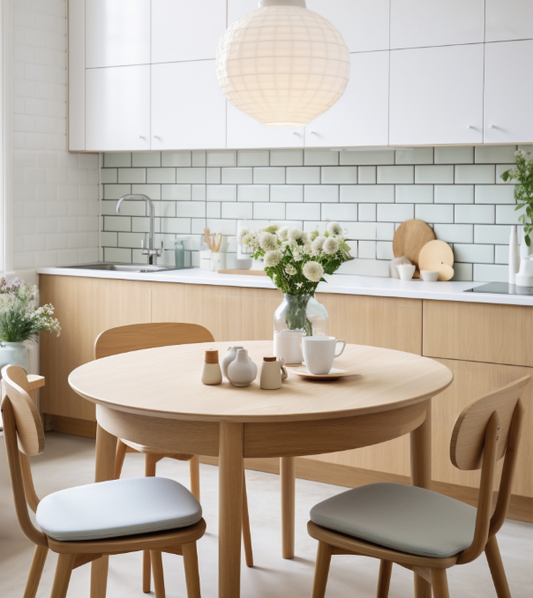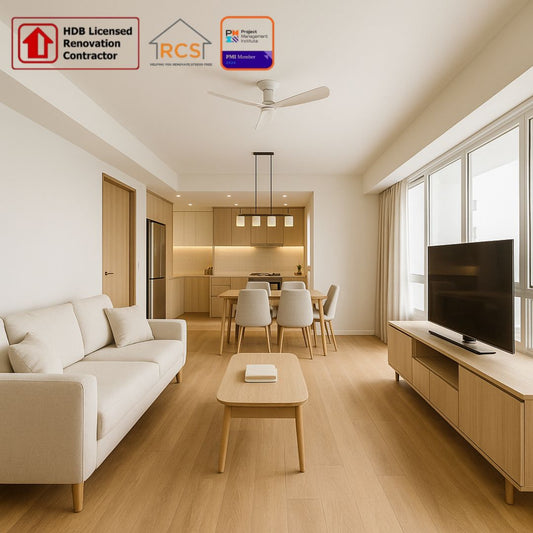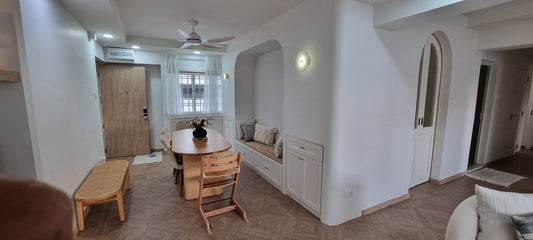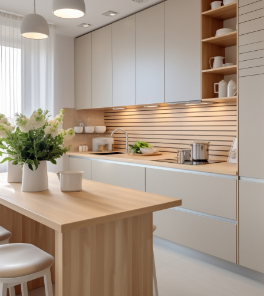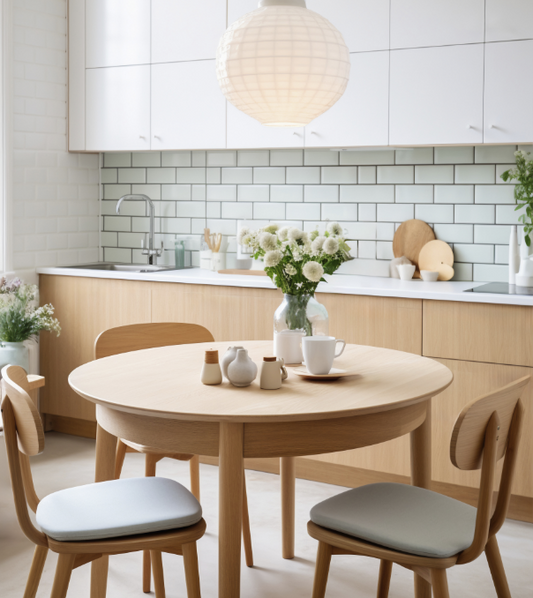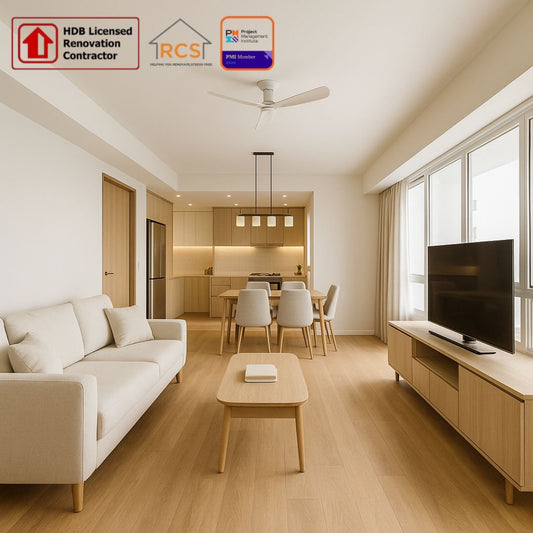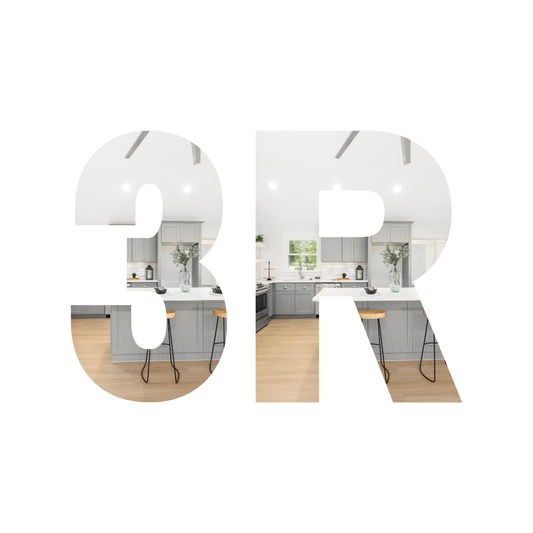Finding the right renovation contractor in Singapore can transform your dreams into reality. Yet, the wrong choice leads to budget problems, delays, and poor workmanship. Therefore, this comprehensive guide helps you navigate Singapore's unique housing landscape with expert tips, current 2025 pricing, and practical advice.
Whether you're renovating an HDB BTO, resale flat, or private condo, selecting the right contractor determines your project's success. This guide provides everything you need to make informed decisions and avoid costly mistakes.
Why Hiring the Right Singapore Renovation Contractor Matters in 2025
The right renovation contractor brings your dream home to life while ensuring legal compliance and quality workmanship. However, the wrong choice leads to budget blowouts, delayed timelines, and substandard results. In Singapore's complex housing landscape, contractors must navigate strict regulations, space constraints, and evolving building codes.
Legal Compliance and Regulatory Expertise
HDB renovations require contractors registered with the HDB Directory of Renovation Contractors (DRC). Without this crucial registration, your contractor cannot legally work on your HDB flat. Moreover, they must understand technical guidelines, submission processes, and permit requirements that change annually.
Professional contractors stay updated with 2025 regulatory changes, including new sustainability requirements, noise regulations, and safety protocols. They handle permit applications efficiently, preventing costly delays that plague DIY approaches or unlicensed contractors.
Climate-Specific Material Knowledge
Singapore's tropical climate demands specific material selections and installation techniques. Expert contractors understand humidity management, prevent mold growth, and select finishes that withstand temperature fluctuations. Their knowledge saves you from premature deterioration and costly repairs.
Furthermore, established renovation contractors maintain relationships with reliable suppliers, passing bulk purchase savings directly to you. They coordinate various specialists—plumbers, electricians, carpenters—creating seamless renovation experiences while ensuring quality control.
Financial Protection and Value Maximization
Reputable contractors provide transparent pricing, detailed contracts, and warranty protection. They help maximize your renovation investment through strategic material choices, efficient project management, and adherence to timelines that prevent additional accommodation costs.
Quality contractors also increase property values through professional workmanship and compliance with building standards. Their work stands up to resale inspections and adds measurable value to your investment.
Complete HDB Renovation Permit Process Guide 2025
Understanding Singapore's permit requirements prevents costly delays and legal issues. The process has become more streamlined in 2025, but compliance remains mandatory for all renovation works.
Updated HDB e-Services Submission Process
All HDB flat renovations require proper approvals through the official HDB portal. First, your renovation contractor Singapore must apply through the HDB e-Services portal using their unique DRC account. Next, submit detailed plans with specifications for all proposed works.
2025 Processing Times:
- Standard Approval: 2-5 working days for basic renovations
- Special Approval: 7-14 working days for structural modifications
- Complex Projects: Up to 21 working days for major alterations
Comprehensive Permit Requirements by Work Type
| Renovation Type | Permit Required | Special Conditions & Costs |
|---|---|---|
| Hacking Non-Structural Walls | Yes - Special Approval | PE endorsement required (S$300-500); debris disposal permit (S$100-200) |
| Bathroom Waterproofing | Yes - Mandatory for Resale | Professional waterproofing certificate required (S$500-1,000) |
| Electrical Rewiring | Yes | Licensed electrician with EMA registration; load assessment may be required |
| Window/Grille Modifications | Yes - Special Approval | BCA-approved contractor; aesthetic compliance with building facade |
| Flooring Replacement | Yes | Sound insulation requirements for upper floors; thickness restrictions (max 50mm) |
| Kitchen Cabinet Installation | Yes | Gas point modifications require licensed fitter; electrical safety compliance |
| Air-Con Installation | Yes | Drainage compliance; external aesthetics approval for condenser placement |
Enhanced HDB Directory of Renovation Contractors (DRC) Requirements
Only contractors registered in the official HDB Directory are authorized to perform HDB renovations legally. The 2025 requirements have become stricter, with annual compliance reviews and performance monitoring.
Verify contractor credentials through:
- Official HDB e-Services DRC search portal
- BCA contractor registration verification
- ACRA business registration confirmation
- CaseTrust accreditation status (for additional consumer protection)
Critical Renovation Restrictions Updated for 2025
- No hacking of structural walls (marked in bold/black on floor plans)
- No tampering with bomb shelter doors or household shelter areas
- No unauthorized removal of original waterproofing in bathrooms
- Restricted renovation hours: 9 AM-6 PM weekdays/Saturdays; no work Sundays/public holidays
- Maximum permit validity: 1 month for resale flats, 3 months for BTO units
- Mandatory neighbor notification 3 days before starting noisy works
- Debris disposal only through authorized waste management contractors
For peace of mind, ask potential renovation contractors to explain their permit application process, projected timelines, and compliance monitoring procedures. Request documentation showing their current HDB-DRC registration status before signing any contract.
Singapore Renovation Costs 2025: Complete Price Breakdown
Understanding current renovation costs helps set realistic budgets and prevents unpleasant surprises during your home transformation journey. 2025 pricing reflects material cost stabilization after previous volatility, though labor costs continue rising due to skilled worker shortages.
Updated Cost Ranges for 2025 Projects
| Property Type | Basic Renovation Range | Mid-Range Package | Premium Range |
|---|---|---|---|
| 3-Room BTO | S$30,000 - S$42,000 | S$42,000 - S$55,000 | S$55,000 - S$75,000 |
| 4-Room BTO | S$45,000 - S$58,000 | S$58,000 - S$75,000 | S$75,000 - S$95,000 |
| 5-Room BTO | S$60,000 - S$75,000 | S$75,000 - S$95,000 | S$95,000 - S$120,000 |
| 3-Room Resale | S$40,000 - S$58,000 | S$58,000 - S$78,000 | S$78,000 - S$105,000 |
| 4-Room Resale | S$55,000 - S$75,000 | S$75,000 - S$95,000 | S$95,000 - S$125,000 |
| 5-Room Resale | S$70,000 - S$90,000 | S$90,000 - S$115,000 | S$115,000 - S$150,000 |
| Condo 3-Bedroom | S$60,000 - S$85,000 | S$85,000 - S$115,000 | S$115,000 - S$180,000 |
| Landed Property | S$80,000 - S$150,000 | S$150,000 - S$300,000 | S$300,000 - S$600,000+ |
Detailed Package Pricing by Work Type
| Package Type | BTO Pricing | Resale Pricing | Scope of Work |
|---|---|---|---|
| Kitchen Package (Standard) | S$11,500 - S$15,000 | S$14,500 - S$19,000 | Cabinets, countertop, hob, hood, sink |
| Kitchen Package (Premium) | S$18,000 - S$25,000 | S$22,000 - S$32,000 | Quartz countertop, soft-close hinges, premium appliances |
| 2-Toilet Package (Standard) | S$10,000 - S$13,000 | S$12,000 - S$16,000 | Basic tiles, sanitary ware, simple vanity |
| 2-Toilet Package (Premium) | S$15,000 - S$20,000 | S$18,000 - S$25,000 | Designer tiles, premium fittings, custom vanity |
| Whole House (4-Room) | S$45,000 - S$65,000 | S$58,000 - S$85,000 | Complete renovation including all rooms |
Cost Factor Analysis for 2025
Several key factors significantly influence renovation costs in Singapore. Property type matters most—resale flats cost 25-40% more than BTO units due to demolition, disposal, and infrastructure upgrades. Material choices create the biggest pricing variations, with premium options like marble countertops and solid wood flooring substantially increasing budgets.
Material Cost Breakdown (per square foot):
- Flooring: Vinyl (S$3-8), Laminate (S$5-12), Engineered Wood (S$8-18), Marble (S$15-35)
- Tiles: Ceramic (S$2-8), Porcelain (S$4-15), Natural Stone (S$10-30)
- Paint: Standard (S$2-4/sqm), Premium (S$5-8/sqm), Specialty Finishes (S$10-20/sqm)
- Countertops: Laminate (S$15-25), Quartz (S$45-85), Marble (S$60-120)
Labor costs represent 40-50% of total renovation budgets, with skilled tradesmen commanding premium rates. Electrical and plumbing specialists cost S$80-120 per hour, while general construction workers charge S$25-40 per hour in 2025.
Remember that the lowest quote doesn't guarantee best value. Focus on transparent pricing, quality guarantees, comprehensive warranties, and proven track records when comparing contractors. Request itemized quotations specifying all inclusions, exclusions, and potential additional costs.
Comprehensive Renovation Packages: BTO vs Resale Solutions
Renovation packages provide structured solutions with defined scopes and transparent pricing. However, packages differ substantially between property types, renovation scales, and quality levels when you hire a renovation contractor.
Enhanced HDB BTO Packages for 2025
Most HDB renovation contractors offer these comprehensive package categories for new BTO flats:
Essential Packages
- Move-In Ready Package: Basic essentials for immediate occupancy including painting, simple lighting, basic flooring (S$8,000-12,000)
- Kitchen Starter Package: Basic cabinets, countertop, hob, hood (S$6,000-9,000)
- Bathroom Basic Package: Essential fittings, simple tiles, standard sanitary ware (S$4,500-6,500 per bathroom)
Standard Packages
- Kitchen Standard Package: Mid-range cabinets, quartz countertop, built-in appliances (S$11,500-15,000)
- Bathroom Standard Package: Quality tiles, modern fixtures, basic storage (S$7,000-9,500 per bathroom)
- Living Areas Package: Flooring, painting, basic built-ins, lighting (S$12,000-18,000)
Premium Packages
- Luxury Kitchen Package: Custom cabinets, premium appliances, designer finishes (S$18,000-28,000)
- Spa Bathroom Package: Designer tiles, premium fittings, custom storage (S$12,000-18,000 per bathroom)
- Smart Home Package: Automated lighting, security systems, climate control (S$8,000-15,000)
Specialized HDB Resale Packages
Resale packages from house renovation contractors in Singapore address unique challenges of older properties:
Restoration Packages
- Kitchen Restoration: Complete tear-down and rebuild with modern systems (S$15,000-22,000)
- Bathroom Restoration: Waterproofing, modern plumbing, contemporary design (S$10,000-15,000 per bathroom)
- Electrical Upgrade: Complete rewiring, modern panel, smart switches (S$3,000-6,000)
Modernization Packages
- Open-Concept Conversion: Wall removal, space reconfiguration, structural updates (S$8,000-15,000)
- Storage Optimization: Custom built-ins, space-saving solutions (S$6,000-12,000)
- Energy Efficiency Upgrade: Insulation, efficient lighting, smart systems (S$4,000-8,000)
Complete Transformation Packages
- Full House Renovation (4-Room): Complete overhaul including hacking, rebuilding, modernization (S$65,000-95,000)
- Luxury Makeover: Premium materials, custom features, designer elements (S$95,000-140,000)
Private Property Solutions
Condo and landed property renovations offer more flexibility but require specialized expertise:
Condominium Packages
- Luxury Condo Standard: High-end finishes, custom millwork, premium appliances (S$80,000-120,000)
- Executive Upgrade: Designer selections, smart home integration, premium systems (S$120,000-180,000)
Landed Property Solutions
- Modern Family Home: Contemporary design, family-friendly features (S$150,000-250,000)
- Luxury Estate Renovation: High-end everything, custom architecture, premium systems (S$300,000-600,000+)
Package Selection Tips: Consider your lifestyle needs, future plans, and resale value when choosing packages. Many contractors allow customization within package frameworks, providing flexibility while maintaining cost control.
2025 Singapore Interior Design Trends for Modern Homes
Beyond basic renovation, contemporary design elevates your living space and enhances property value. Consider these dominant interior design trends embraced by Singapore homeowners in 2025:
Sustainable Luxury Design
Environmental consciousness drives 2025's most popular trend, combining luxury aesthetics with sustainable materials and energy-efficient systems.
Key Elements:
- Reclaimed wood features and FSC-certified timber
- Low-VOC paints and eco-friendly finishes
- Energy-efficient LED lighting and smart home systems
- Natural fiber textiles and organic materials
- Indoor air-purifying plants and living walls
Cost Impact: S$35,000-S$50,000 for complete 4-room sustainable renovation
Biophilic Modern Design
Singapore's tropical climate inspires designs that blur indoor-outdoor boundaries, incorporating natural elements throughout living spaces.
Key Elements:
- Large windows and glass doors maximizing natural light
- Natural stone and wood accent walls
- Indoor gardens and water features
- Earth-tone color palettes with green accents
- Natural textures in furniture and soft furnishings
Cost Impact: S$40,000-S$60,000 for complete 4-room biophilic transformation
Smart Minimalist Luxury
Technology-integrated minimalism defines modern Singapore living, emphasizing clean lines, hidden storage, and seamless automation.
Key Elements:
- Hidden storage solutions and built-in furniture
- Integrated smart home systems and wireless technology
- Premium materials in restrained color palettes
- Statement lighting as sculptural elements
- Multi-functional spaces with flexible configurations
Cost Impact: S$45,000-S$70,000 for complete 4-room smart minimalist renovation
Textured Contemporary Style
Rich textures and tactile surfaces create visual interest while maintaining sophisticated aesthetics perfect for Singapore's modern apartments.
Key Elements:
- Textured wall finishes like limewash and microcement
- Mixed material combinations (wood, metal, stone)
- Curved architectural elements and organic shapes
- Layered lighting creating mood and ambiance
- Artisanal furniture and handcrafted details
Cost Impact: S$38,000-S$55,000 for complete 4-room textured contemporary design
Flexible Living Spaces
Post-pandemic lifestyle changes emphasize adaptable spaces supporting work, rest, and play within Singapore's compact homes.
Key Elements:
- Convertible home offices and study nooks
- Modular furniture and moveable storage
- Open-plan layouts with defined zones
- Multi-purpose rooms serving various functions
- Technology integration supporting remote work
Cost Impact: S$32,000-S$48,000 for complete 4-room flexible living renovation
Most house renovation contractors in Singapore can adapt their execution to match these popular styles. However, complex design implementations benefit from specialized interior designers partnering with experienced renovation contractors for optimal results.
How to Choose the Best Renovation Contractor in Singapore 2025
Finding the right renovation partner requires systematic evaluation and thorough vetting. Follow this comprehensive checklist to ensure successful project outcomes:
Essential Credentials and Licensing Verification
Mandatory Requirements
- HDB Directory Registration: Verify current DRC status through official HDB e-Services portal
- BCA License: Check Building and Construction Authority registration for structural work capability
- ACRA Business Registration: Confirm legitimate business operations through BizFile+ using UEN
- Valid Insurance Coverage: Ensure comprehensive liability and workers' compensation insurance
Additional Accreditations
- CaseTrust Certification: Provides consumer protection including deposit guarantees, standard contracts, and mediation services
- ISO Quality Certifications: Demonstrates commitment to quality management systems
- Green Building Council Membership: Indicates sustainability expertise and eco-friendly practices
- Industry Association Memberships: SCAL, BCA-affiliated organizations showing professional standing
Comprehensive Portfolio and Experience Assessment
Project Evaluation Criteria
- Request 10+ recent projects similar to your property type and renovation scope
- Verify portfolio authenticity through client references and site visits
- Assess design versatility across different styles and budgets
- Review problem-solving capabilities in challenging projects
- Evaluate quality consistency across multiple completed works
Experience Verification
- Years in Business: Minimum 3-5 years for established track record
- Project Volume: Consistent project flow indicating market confidence
- Specialization Match: Expertise in your specific property type and renovation scale
- Team Stability: Low staff turnover indicating good management and work environment
Financial Stability and Contract Terms Review
Financial Health Indicators
- Physical office location (avoid virtual office setups)
- Proper showroom or workshop facilities
- Established supplier relationships and credit terms
- Transparent pricing structure with detailed breakdowns
- Reasonable payment schedules tied to project milestones
Contract Protection Elements
- Detailed Scope: Comprehensive work specifications leaving no ambiguity
- Material Standards: Specific brands, grades, and quality requirements
- Timeline Commitments: Realistic schedules with penalty clauses for delays
- Warranty Terms: Minimum 1-2 years covering workmanship and materials
- Change Order Procedures: Clear processes for handling modifications and additional work
Communication and Project Management Evaluation
Service Standards Assessment
- Response Time: Quick, professional responses to inquiries and concerns
- Communication Clarity: Ability to explain technical concepts in understandable terms
- Progress Reporting: Regular updates with photographic documentation
- Problem Resolution: Proactive approach to addressing issues and challenges
- Customer Service: Dedicated project managers and accessible support team
Critical Red Flags to Avoid
Documentation Issues
- Missing or expired business registration and licensing
- Reluctance to provide detailed, itemized quotations
- Contracts with vague scopes or hidden cost clauses
- No physical business address or proper facilities
Pricing and Business Practice Concerns
- Quotes significantly below market rates (typically 20%+ lower)
- Demands for large upfront payments (more than 25%)
- High-pressure sales tactics or limited-time offers
- Exclusively positive reviews on contractor's own website
- Reluctance to provide client references or portfolio verification
Professional Standards Violations
- Door-to-door solicitation or unsolicited contact
- Inability to explain permit requirements and processes
- No insurance coverage or workers' compensation
- Subcontracting without disclosure or authorization
By systematically evaluating contractors against these criteria, you significantly increase chances of successful renovation outcomes. Remember to obtain multiple detailed quotes, compare not just prices but comprehensive scopes of work, and trust your instincts about professionalism and communication quality.
Singapore Renovation Loan Guide 2025: Best Rates & Smart Financing
Strategic renovation financing maximizes your investment potential while preserving cash flow. Compare 2025 options to save thousands in interest payments and optimize your renovation budget.
Top Renovation Loan Providers Comparison 2025
| Bank | Interest Rate (EIR p.a.) | Maximum Loan | Tenure | Special Features |
|---|---|---|---|---|
| DBS Renovation Loan | 3.88% - 5.88% | Up to S$30,000 | 1-5 years | No processing fee; flexible repayment; contractor invoice required |
| OCBC Renovation Loan | 4.18% - 6.28% | Up to 6x monthly income | 1-5 years | Promotional rates for existing customers; bundled packages available |
| UOB Renovation Loan | 3.98% - 5.98% | Up to S$30,000 | 1-5 years | Fast approval; online application; competitive rates |
| Standard Chartered | 3.78% - 5.88% | Up to S$30,000 | 1-5 years | Lowest advertised rates; wealth management perks |
| CIMB Renovation Loan | 3.99% - 6.18% | Up to S$30,000 | 1-5 years | Flexible terms; competitive middle market rates |
| Maybank Renovation Loan | 4.25% - 6.48% | Up to S$30,000 | 1-5 years | Regional bank stability; relationship banking benefits |
Alternative Financing Options
Personal Loans for Renovation
- Interest Rates: 5.5% - 8.5% EIR (higher than renovation loans)
- Maximum Amount: Up to 10x monthly income
- Advantages: No contractor documentation required; can include furniture and appliances
- Best For: Smaller renovations, furniture purchases, or when contractor invoices unavailable
HDB CPF Usage
- Eligible Works: Structural improvements, essential repairs, accessibility modifications
- Maximum Amount: Up to CPF Ordinary Account balance
- Requirements: Registered contractor, approved renovation plans
- Considerations: Reduces retirement savings; opportunity cost of CPF interest
Credit Card Installment Plans
- Interest Rates: 0% - 2.5% monthly (promotional periods)
- Maximum Amount: Based on credit limit
- Best For: Appliances, furniture, short-term financing
- Caution: High penalty rates after promotional periods
Renovation Loan Application Process
Required Documentation
- Official contractor quotation with company details
- Property ownership documents (lease, title deed)
- Income verification (pay slips, tax notices, bank statements)
- Identification documents and address proof
- HDB renovation permit approval (if applicable)
Application Timeline
- Application Processing: 3-7 working days
- Document Verification: 1-3 working days
- Loan Approval: 1-2 working days
- Fund Disbursement: 1-3 working days
- Total Timeline: 7-14 working days typically
Strategic Loan Utilization Tips
Maximizing Value
- Compare EIR rates rather than advertised rates for true cost comparison
- Consider total interest cost over loan tenure, not just monthly payments
- Negotiate better rates based on existing banking relationships
- Time applications during promotional periods for best rates
- Bundle with other banking products for package discounts
Cost Management Strategies
- Borrow only required amounts to minimize interest costs
- Choose shortest comfortable tenure to reduce total interest
- Make additional payments when possible to reduce principal
- Avoid early repayment penalties by understanding loan terms
- Monitor interest rate changes for refinancing opportunities
Expert Recommendation: Renovation loans typically offer better rates than personal loans but require contractor documentation. Plan financing early in your renovation process to ensure smooth fund availability when needed.
Comprehensive Guide to Avoiding Renovation Scams in Singapore
Unfortunately, renovation scams continue evolving in Singapore's competitive market. Protect your investment with these essential precautions and red flag identification strategies.
Enhanced Protection Measures for 2025
Mandatory Verification Steps
- HDB Licensing Verification: Use official HDB e-Services portal to confirm DRC registration status
- Business Registration Check: Verify ACRA registration through BizFile+ using company UEN
- CaseTrust Accreditation: Confirm deposit protection and standardized contract benefits
- Insurance Verification: Request current liability and workers' compensation certificates
- Physical Address Confirmation: Visit actual office/showroom facilities, avoid virtual addresses
Financial Protection Strategies
- Payment Schedule Limits: Never pay more than 25% upfront; tie payments to completion milestones
- Bank Transfers Only: Avoid cash payments; use traceable bank transfers or checks
- Detailed Contracts: Require itemized quotations with material specifications and labor costs
- Change Order Documentation: Get written approvals for any scope or cost modifications
- Retention Amounts: Hold 5-10% final payment until defect rectification period expires
Advanced Scam Detection Techniques
Digital Era Red Flags
- Fake Online Presence: Recently created websites, stock photos, copied content from legitimate contractors
- Social Media Manipulation: Purchased followers, fake reviews, limited engagement history
- Communication Inconsistencies: Different contact numbers across platforms, unprofessional email addresses
- Portfolio Theft: Using other contractors' project photos without permission or attribution
Behavioral Warning Signs
- High-Pressure Tactics: Limited-time offers, urgent decision demands, emotional manipulation
- Door-to-Door Solicitation: Unsolicited visits, claiming to work in neighborhood, leftover materials offers
- Cash-Only Demands: Refusing proper payment methods, no receipt provision
- Permit Avoidance: Suggesting to skip permit applications, claiming unnecessary approvals
- Subcontractor Ambiguity: Unclear about who performs work, no worker identification
Common Scam Scenarios in Singapore
The "Discount Materials" Scam
- Approach: Offering leftover materials from previous jobs at discounted rates
- Reality: Low-quality materials, inflated original prices, or stolen goods
- Protection: Always verify material sources, check warranties, and compare market prices
The "Immediate Start" Trap
- Approach: Claiming urgent availability requiring immediate deposit and start
- Reality: Pressure tactic to prevent proper verification and comparison
- Protection: Legitimate contractors provide reasonable planning time and detailed proposals
The "Additional Work" Inflation
- Approach: Low initial quotes followed by numerous "necessary" additional charges
- Reality: Deliberate underquoting to win contracts, then inflating costs during work
- Protection: Detailed initial quotes, written change order processes, fixed-price contracts
Legal Recourse and Dispute Resolution
Government Protection Mechanisms
- CASE (Consumers Association): Mediation services for CaseTrust-accredited contractors
- Small Claims Tribunals: Legal recourse for claims up to S$20,000
- HDB Feedback: Report unlicensed contractors working on HDB properties
- Police Reports: For clear fraud cases involving significant financial losses
Documentation for Disputes
- Comprehensive photo/video records of work progress and quality issues
- All communication records (emails, WhatsApp, phone logs)
- Payment receipts and bank transfer records
- Original contracts and quotations with all modifications
- Independent professional assessments of work quality
Preventive Measures and Best Practices
Due Diligence Checklist
- Obtain minimum 3 detailed quotations for comparison
- Visit contractor's previous projects with homeowner permission
- Speak directly with recent client references
- Verify all credentials through official government portals
- Read and understand all contract terms before signing
Ongoing Project Monitoring
- Regular site visits during work hours to monitor progress
- Photo documentation of work quality at each phase
- Open communication channels with project managers
- Prompt addressing of concerns before issues escalate
- Professional inspections at key milestones
Remember: If a deal seems too good to be true, it usually is. Invest time in proper contractor selection to avoid costly mistakes and legal complications. Quality work requires fair compensation and professional practices.
Expert HDB Renovation Budget Optimization Guide 2025
Strategic budget planning helps maximize renovation value while preventing cost overruns. These proven techniques help stretch your renovation budget further without compromising quality or functionality.
Strategic Priority Planning
High-Impact Investment Areas
- Kitchen Renovation: Highest ROI for resale value and daily use satisfaction
- Bathroom Upgrades: Essential for comfort and property value, especially in resale flats
- Flooring Investment: Visual impact and durability justify quality material selection
- Built-in Storage: Maximizes space efficiency in Singapore's compact homes
- Lighting Design: Cost-effective way to transform ambiance and functionality
Lower Priority Areas for Budget Constraints
- Bedroom Carpentry: Can use ready-made furniture initially, upgrade later
- Decorative Elements: Artwork, accessories can be added gradually
- Premium Appliances: Standard models offer good functionality at lower costs
- Complex Lighting: Simple fixtures work well, can upgrade over time
Smart Material Selection Strategies
High-Value Material Choices
| Category | Budget Option | Mid-Range Choice | Premium Alternative | Best Value Pick |
|---|---|---|---|---|
| Flooring | Vinyl (S$3-6/sqft) | Laminate (S$5-10/sqft) | Engineered Wood (S$8-15/sqft) | Quality Vinyl |
| Countertops | Laminate (S$15-25/sqft) | Engineered Quartz (S$35-55/sqft) | Natural Stone (S$60-120/sqft) | Engineered Quartz |
| Bathroom Tiles | Ceramic (S$2-5/sqft) | Porcelain (S$4-8/sqft) | Natural Stone (S$10-20/sqft) | Quality Porcelain |
| Kitchen Cabinets | Melamine (S$400-600/linear ft) | Laminate (S$600-900/linear ft) | Solid Wood (S$1000-1500/linear ft) | Quality Laminate |
| Paint | Standard Emulsion (S$20-30/5L) | Premium Interior (S$40-60/5L) | Designer/Eco Paint (S$80-120/5L) | Premium Interior |
Strategic Material Mixing
- Feature vs. Standard: Use premium materials for focal points, standard for larger areas
- Visible vs. Hidden: Invest in visible finishes, save on structural elements
- High-Use vs. Low-Use: Quality materials for kitchens/bathrooms, budget options for spare rooms
- Now vs. Later: Install infrastructure for future upgrades without immediate material investment
Timing and Procurement Optimization
Seasonal Cost Savings
- Off-Peak Periods: January-March and August-September typically offer 10-15% discounts
- Chinese New Year: Pre-holiday bookings often include promotional pricing
- Material Sales: Time renovations around major sale periods (March, September, November)
- Contractor Availability: Off-peak periods provide better contractor selection and attention
Bulk Purchase Strategies
- Combined Orders: Coordinate with neighbors for volume discounts on common materials
- Overstock Deals: Purchase quality overstock materials at significant discounts
- Showroom Displays: Buy display units and samples at reduced prices
- End-of-Line Products: Secure good materials being discontinued
Project Phasing and Scope Management
Effective Renovation Phasing
- Phase 1: Essential systems (plumbing, electrical, structural)
- Phase 2: Core living areas (kitchen, main bathroom, living room)
- Phase 3: Secondary spaces (bedrooms, guest bathroom, storage)
- Phase 4: Finishing touches (lighting, accessories, landscaping)
DIY vs. Professional Decision Matrix
| Task Category | DIY Suitable | Professional Recommended | Potential Savings |
|---|---|---|---|
| Painting | ✓ Interior walls, ceilings | ✗ Exterior, textured finishes | 40-60% |
| Assembly | ✓ Furniture, simple fixtures | ✗ Built-ins, complex systems | 30-50% |
| Tiling | △ Simple patterns, small areas | ✓ Waterproofing, complex layouts | 20-40% |
| Electrical | ✗ All work requires licensing | ✓ Mandatory professional installation | 0% |
| Plumbing | △ Basic fixture replacement | ✓ Pipe work, waterproofing | 15-30% |
Hidden Cost Prevention
Common Unexpected Expenses
- Electrical Load Upgrades: S$1,500-3,000 for older properties requiring panel upgrades
- Structural Repairs: S$2,000-5,000 for unexpected concrete or structural issues
- Permit Extensions: S$200-500 for projects exceeding timeline approvals
- Disposal Fees: S$300-800 for debris removal and disposal permits
- Temporary Accommodation: S$100-200 per day if renovation delays force relocation
Contingency Budget Guidelines
- New BTO Flats: 10-15% contingency for unforeseen issues
- Resale HDB Flats: 15-20% contingency for hidden problems
- Older Properties (20+ years): 20-25% contingency for infrastructure updates
- Extensive Renovations: 25-30% contingency for complex projects
Value Engineering Techniques
Cost-Effective Alternatives
- Open Shelving vs. Upper Cabinets: Save 30-40% on kitchen storage costs
- Overlay vs. Hacking: Reduce bathroom renovation costs by 25-35%
- Vinyl vs. Hardwood: Achieve similar aesthetics at 50-70% cost reduction
- Quartz vs. Marble: Get luxury appearance with 40-60% savings and better durability
- LED vs. Designer Lighting: Modern LED fixtures provide style and efficiency
Space Optimization vs. Expansion
- Built-in Storage: More cost-effective than expanding spaces
- Multi-functional Furniture: Reduces need for additional rooms
- Mirrors and Lighting: Create sense of space without structural changes
- Clever Layouts: Professional space planning maximizes existing square footage
Final Budget Tip: Always get itemized quotes from multiple contractors, clearly understand what's included/excluded, and maintain detailed records of all expenses for better budget control and future reference.
Sustainable HDB Renovation: Eco-Friendly Options for Singapore Homes
Sustainable renovation choices benefit environmental health, indoor air quality, and long-term property value. Singapore's green building initiatives make eco-friendly renovations increasingly attractive for forward-thinking homeowners.
Government Incentives and Green Building Standards
Singapore Green Building Initiatives 2025
- BCA Green Mark Scheme: Certification for sustainable building practices and energy efficiency
- Green Finance Incentives: Lower interest rates for eco-friendly renovation loans
- Carbon Efficiency Grants: Rebates for energy-efficient appliances and systems
- Sustainable Materials Tax Relief: Reduced GST on certified sustainable building materials
HDB Eco-Friendly Guidelines
- Mandatory energy-efficient lighting in common areas
- Water-saving fixtures requirements for new installations
- Waste reduction targets during renovation process
- Indoor air quality standards for adhesives and finishes
Comprehensive Sustainable Material Guide
| Material Category | Eco-Friendly Option | Environmental Benefits | Health Benefits | Cost Premium |
|---|---|---|---|---|
| Flooring | Bamboo, Cork, Reclaimed Wood | Rapidly renewable, carbon neutral | Natural antimicrobial properties | +15-30% |
| Paint & Finishes | Zero-VOC, Natural Clay, Lime | Reduced air pollution, non-toxic | Better indoor air quality, hypoallergenic | +20-40% |
| Insulation | Recycled Denim, Sheep Wool, Cellulose | Waste diversion, renewable sources | Non-toxic, fire resistant | +10-25% |
| Cabinetry | FSC-Certified Wood, Bamboo Composite | Sustainable forestry, reduced deforestation | Low formaldehyde emissions | +25-45% |
| Countertops | Recycled Glass, Paper Composite, Bio-Resin | Waste utilization, renewable sources | Non-porous, antimicrobial | +20-50% |
| Tiles | Recycled Ceramic, Natural Stone, Bio-Based | Reduced mining, waste utilization | Natural, non-toxic composition | +15-35% |
Energy Efficiency Systems and Technologies
Advanced Lighting Solutions
- LED Technology: 80% energy reduction compared to incandescent, 25-year lifespan
- Smart Lighting Controls: Motion sensors, daylight harvesting, automated dimming
- Natural Light Optimization: Light tubes, reflective surfaces, strategic window placement
- Circadian Lighting: Health-focused lighting that adjusts color temperature throughout day
Climate Control Innovations
- Inverter Air Conditioning: 30-50% energy savings compared to conventional systems
- Smart Thermostats: Learning algorithms optimize temperature control and energy usage
- Passive Cooling: Strategic ventilation, thermal mass, shading systems
- Heat Recovery Systems: Capture waste heat for water heating applications
Water Conservation Technologies
- Low-Flow Fixtures: WELs-rated taps and showers reduce consumption by 30-50%
- Dual-Flush Toilets: Variable flush volumes save 20-30% water usage
- Greywater Systems: Reuse sink and shower water for toilet flushing
- Smart Water Meters: Real-time monitoring helps identify leaks and optimize usage
Indoor Air Quality Enhancement
Natural Ventilation Strategies
- Cross-Ventilation Design: Strategic window and door placement for natural airflow
- Stack Ventilation: Use temperature differences to drive air movement
- Courtyard Integration: Internal courtyards create natural cooling and air circulation
- Green Walls: Living walls provide natural air filtration and humidity control
Air Purification Systems
- HEPA Filtration: Remove 99.97% of particles 0.3 microns and larger
- Activated Carbon: Absorb odors, chemicals, and volatile organic compounds
- UV-C Sterilization: Kill bacteria, viruses, and mold spores
- Ionization Technology: Remove airborne particles and neutralize pollutants
Waste Reduction and Circular Economy Practices
Construction Waste Minimization
- Precise Planning: Accurate measurements reduce material waste by 15-25%
- Modular Design: Standardized components minimize cutting waste
- Material Recovery: Salvage and reuse existing materials where possible
- Recycling Programs: Partner with waste management companies for material recovery
Sustainable Procurement Strategies
- Local Sourcing: Reduce transportation emissions and support local economy
- Bulk Purchasing: Minimize packaging waste through consolidated orders
- Returnable Packaging: Choose suppliers offering packaging take-back programs
- Lifetime Value Analysis: Consider durability and maintenance costs in material selection
Smart Home Integration for Sustainability
Energy Management Systems
- Home Energy Monitoring: Real-time tracking of electricity usage and costs
- Automated Load Management: Optimize appliance operation during off-peak hours
- Solar Integration: Smart systems maximize solar panel efficiency and battery storage
- Grid Integration: Participate in demand response programs for additional savings
Water Management Automation
- Leak Detection Systems: Automatic shutoff prevents water damage and waste
- Irrigation Controls: Weather-based watering systems for balcony gardens
- Usage Analytics: Detailed consumption tracking identifies optimization opportunities
- Quality Monitoring: Real-time water quality sensors ensure health and safety
Financial Benefits and Return on Investment
Utility Savings Analysis
| Eco-Friendly Upgrade | Initial Investment | Annual Savings | Payback Period | 20-Year ROI |
|---|---|---|---|---|
| LED Lighting Complete | S$1,500-2,500 | S$300-500 | 3-5 years | 400-600% |
| Inverter Air Conditioning | S$3,000-5,000 | S$400-800 | 4-8 years | 200-400% |
| Water-Efficient Fixtures | S$800-1,500 | S$150-300 | 3-6 years | 300-500% |
| Smart Home Systems | S$2,000-4,000 | S$250-500 | 5-10 years | 150-300% |
| High-Performance Windows | S$4,000-8,000 | S$200-400 | 10-15 years | 100-200% |
Property Value Enhancement
- Green Certification Premium: 3-7% higher resale values for certified green homes
- Energy Efficiency Appeal: Increasingly important factor for discerning buyers
- Health-Conscious Market: Growing demand for homes with superior indoor air quality
- Future-Proofing: Compliance with evolving environmental regulations
Sustainability Recommendation: Focus on high-impact, quick-payback improvements first (LED lighting, efficient appliances), then gradually implement more comprehensive sustainable features. The combination of environmental benefits, health improvements, and financial returns makes eco-friendly renovation a smart long-term investment.
Renovation Timeline Management: Planning for Success in Singapore
Proper timeline planning prevents delays, minimizes costs, and reduces stress during your renovation journey. Understanding realistic schedules helps set appropriate expectations and coordinate various project phases effectively.
Comprehensive Project Timeline Breakdown
Pre-Renovation Phase (4-8 weeks)
- Week 1-2: Contractor research, quotations, comparison
- Week 3: Final contractor selection, contract negotiation
- Week 4: Design finalization, material selection
- Week 5-6: Permit applications and approvals
- Week 7: Final planning, material ordering
- Week 8: Project preparation, site setup
Renovation Execution Timelines by Property Type
| Property Type | Light Renovation | Moderate Renovation | Extensive Renovation | Key Factors |
|---|---|---|---|---|
| 3-Room BTO | 4-6 weeks | 6-8 weeks | 8-12 weeks | New condition, minimal hacking |
| 4-Room BTO | 5-7 weeks | 7-10 weeks | 10-14 weeks | Larger space, more systems |
| 5-Room BTO | 6-8 weeks | 8-12 weeks | 12-16 weeks | Complex layouts, multiple bathrooms |
| 3-Room Resale | 6-8 weeks | 8-12 weeks | 12-16 weeks | Hacking required, aging systems |
| 4-Room Resale | 7-10 weeks | 10-14 weeks | 14-20 weeks | Extensive modernization needs |
| 5-Room Resale | 8-12 weeks | 12-16 weeks | 16-24 weeks | Complex infrastructure updates |
| Condominium | 6-10 weeks | 10-16 weeks | 16-26 weeks | MCST approvals, quality expectations |
| Landed Property | 10-16 weeks | 16-28 weeks | 28-52 weeks | Structural complexity, larger scope |
Critical Path Activities and Dependencies
Sequential Work Phases
- Phase 1 - Demolition & Hacking (Week 1-2): Wall removal, disposal, site preparation
- Phase 2 - Structural & MEP (Week 2-4): Electrical, plumbing, structural modifications
- Phase 3 - Wet Works (Week 4-7): Waterproofing, tiling, masonry work
- Phase 4 - Dry Works (Week 6-9): Carpentry, built-ins, cabinetry installation
- Phase 5 - Finishing (Week 8-10): Painting, flooring, final installations
- Phase 6 - Final Touch-ups (Week 10-12): Cleaning, inspections, handover
Common Delay Factors and Mitigation
| Delay Factor | Typical Impact | Prevention Strategy | Mitigation Approach |
|---|---|---|---|
| Permit Delays | 1-3 weeks | Early application, complete documentation | Buffer time in schedule, backup plans |
| Material Shortages | 1-4 weeks | Early ordering, alternative specifications | Flexible material choices, local sourcing |
| Weather Disruptions | 3-7 days | Seasonal planning, covered work areas | Flexible scheduling, indoor work priority |
| Design Changes | 1-2 weeks | Thorough initial planning, clear contracts | Quick decision processes, change order procedures |
| Skilled Labor Shortage | 1-3 weeks | Book experienced contractors early | Flexible timing, backup labor sources |
| Hidden Issues | 1-2 weeks | Thorough pre-renovation inspection | Contingency budget, quick resolution teams |
Seasonal Considerations for Singapore Renovations
Optimal Timing Windows
- January-March: Post-holiday period, good availability, moderate pricing
- April-June: Dry season, minimal weather delays, peak activity period
- July-September: Mixed weather, school holidays may affect schedules
- October-December: Holiday rush, higher pricing, limited availability
Weather Impact Management
- Monsoon Seasons: Plan indoor work during heavy rain periods
- Heat Waves: Schedule intensive work during cooler parts of day
- Humidity Control: Allow extra drying time for paint and adhesives
- Dust Management: Coordinate with neighbors during dry periods
Communication and Progress Monitoring
Stakeholder Communication Plan
- Daily Updates: Brief progress reports via messaging apps
- Weekly Reviews: Detailed progress meetings with photo documentation
- Milestone Reports: Comprehensive reviews at phase completions
- Issue Escalation: Immediate notification of problems or delays
Quality Control Checkpoints
- Pre-Work Inspections: Verify site conditions and material delivery
- Phase Completions: Quality checks before proceeding to next phase
- Midpoint Reviews: Comprehensive assessment at 50% completion
- Pre-Final Inspections: Detailed review before final payments
- Final Handover: Complete walkthrough with defect identification
Timeline Success Tip: Build 15-20% buffer time into your overall schedule to accommodate unexpected delays. Clear communication protocols and regular monitoring help identify issues early, allowing for prompt resolution and minimal impact on overall timelines.
Comprehensive FAQ: Singapore Renovation Contractors 2025
Cost and Budgeting Questions
What is the average cost of an HDB renovation in Singapore for 2025?
The average HDB renovation costs vary significantly by property type and scope. For complete renovations: 3-room BTO flats cost S$30,000-S$55,000, 4-room BTO flats range S$45,000-S$75,000, and 5-room BTO flats cost S$60,000-S$95,000. Resale flats typically cost 25-40% more due to additional hacking, electrical updates, and waterproofing requirements.
How much should I budget for kitchen renovation in Singapore?
Kitchen renovation costs depend on scope and quality level. Basic BTO kitchen packages start from S$11,500-S$15,000, while premium packages with quartz countertops and high-end appliances cost S$18,000-S$28,000. Resale kitchen renovations requiring hacking cost S$14,500-S$32,000 depending on extent of work and material selections.
What hidden costs should I be aware of when planning my renovation budget?
Common hidden costs include electrical load upgrades (S$1,500-S$3,000), structural repairs (S$2,000-S$5,000), permit extensions (S$200-S$500), debris disposal fees (S$300-S$800), and temporary accommodation (S$100-S$200 per day). Always include 15-20% contingency budget for unexpected issues.
Contractor Selection and Verification
How do I verify if my contractor is HDB-approved?
Check contractor HDB approval through the official HDB e-Services portal using the Directory of Renovation Contractors (DRC) search function. Enter the contractor's company name to verify current registration status. Only DRC-listed contractors can legally perform HDB renovation work. Also verify BCA licensing and ACRA business registration for complete credential verification.
What credentials should I look for when choosing a renovation contractor?
Essential credentials include HDB DRC registration (for HDB work), BCA licensing, ACRA business registration with valid UEN, comprehensive insurance coverage, and preferably CaseTrust accreditation for consumer protection. Additional certifications like ISO quality standards and industry association memberships indicate professional commitment.
How many quotations should I obtain before selecting a contractor?
Obtain minimum 3-5 detailed quotations for comparison, ensuring each quote covers identical scope and specifications. Compare not just total prices but also material quality, warranty terms, timeline commitments, and included services. Avoid quotes significantly below market rates as they often indicate limited scope or quality compromises.
Permits and Legal Requirements
What renovation works require HDB permits?
HDB permits are required for hacking non-structural walls, bathroom waterproofing, electrical rewiring, window/grille modifications, flooring replacement, kitchen installations, and air-conditioning work. Minor cosmetic work like painting may not require permits, but using HDB-registered contractors is always recommended for compliance assurance.
How long does the HDB permit approval process take?
Standard HDB permit approvals take 2-5 working days for basic renovations, while special approvals for structural modifications require 7-14 working days. Complex projects may need up to 21 working days. Submit applications early to prevent project delays, and ensure all documentation is complete and accurate.
What happens if I renovate without proper HDB permits?
Unauthorized HDB renovations can result in fines up to S$5,000, forced rectification at owner expense, and legal complications affecting property transactions. HDB conducts regular inspections and maintains strict enforcement. Always ensure proper permits and use only DRC-registered contractors for legal compliance.
Timeline and Project Management
How long does a complete home renovation take in Singapore?
Complete renovation timelines vary by property type and scope. BTO flats typically require 6-12 weeks, while resale flats need 8-16 weeks due to additional hacking and modernization work. Condominiums usually take 8-16 weeks, and landed properties require 16-52 weeks depending on complexity. Include 4-8 weeks for pre-renovation planning and permits.
Can I live in my home during renovation?
Living in your home during renovation is possible for minor works but challenging for extensive renovations involving hacking, electrical work, or multiple rooms. Consider dust, noise, safety concerns, and utility disruptions. Many homeowners prefer temporary accommodation during major renovations for comfort and safety, especially with young children.
What can cause renovation delays and how can I prevent them?
Common delay factors include permit processing, material shortages, weather disruptions, design changes, skilled labor availability, and hidden structural issues. Prevent delays through early permit applications, advance material ordering, thorough initial planning, flexible scheduling, and working with experienced contractors who maintain good supplier relationships.
Financing and Payment
What renovation loan options are available in Singapore?
Singapore banks offer renovation loans with interest rates from 3.88%-6.48% EIR, maximum amounts up to S$30,000, and 1-5 year tenures. Alternative options include personal loans (higher rates but more flexibility), CPF usage for eligible works, and credit card installment plans for smaller purchases. Compare total interest costs when selecting financing options.
How should renovation payments be structured?
Recommended payment structure: 20-25% deposit upon contract signing, 30-40% at key milestones (typically after hacking, after wet works), and final 10-15% upon satisfactory completion after defect rectification period. Avoid large upfront payments and tie payments to actual work completion rather than calendar dates.
Can I use CPF funds for renovation?
CPF Ordinary Account funds can be used for eligible HDB renovation works including structural improvements, essential repairs, and accessibility modifications. Requires HDB-registered contractor and approved renovation plans. Consider opportunity cost of CPF interest (2.5-6% annually) when deciding between CPF usage and external financing options.
Material Selection and Design
What are the most cost-effective materials for Singapore homes?
Best value materials for Singapore's climate include quality vinyl flooring (S$3-8/sqft), engineered quartz countertops (S$35-55/sqft), porcelain tiles (S$4-8/sqft), and low-VOC premium paints. These options balance durability, aesthetics, and cost-effectiveness while withstanding tropical humidity and temperature fluctuations.
How do I choose materials suitable for Singapore's climate?
Select materials with moisture resistance, thermal stability, and mold prevention properties. Recommended options include moisture-resistant MDF for carpentry, non-slip porcelain tiles for wet areas, engineered wood flooring over solid wood, and breathable paint finishes. Avoid materials prone to warping, cracking, or mold growth in high humidity.
What are the latest interior design trends for Singapore homes in 2025?
2025 trends emphasize sustainable luxury, biophilic design, smart minimalism, textured surfaces, and flexible living spaces. Popular elements include eco-friendly materials, natural light maximization, integrated technology, curved architectural features, and multi-functional furniture suited to Singapore's compact living spaces.
Quality and Warranty
What warranty should I expect from renovation contractors?
Standard warranty coverage includes 1-2 years for workmanship defects, 1 year for installed fixtures and fittings, and manufacturer warranties for appliances and materials. Ensure warranty terms are clearly specified in contracts, covering defect rectification, replacement parts, and labor costs. CaseTrust-accredited contractors often provide enhanced warranty protection.
How can I ensure quality workmanship during renovation?
Ensure quality through contractor verification, detailed contracts with specifications, regular site inspections, progress photo documentation, milestone quality checks, and retaining final payment until defect rectification completion. Engage contractors with proven track records and request client references for verification.
What should I do if I'm unsatisfied with renovation work quality?
Address quality issues immediately with contractor through documented communication. For CaseTrust-accredited contractors, seek CASE mediation assistance. For serious disputes, consider Small Claims Tribunals for claims up to S$20,000. Maintain comprehensive documentation including contracts, photos, and communication records for dispute resolution.
Special Considerations
Are there different requirements for BTO vs resale flat renovations?
BTO renovations focus on fresh installations with 3-month permit validity, while resale renovations require extensive hacking, waterproofing, and infrastructure updates with 1-month permit validity. Resale projects typically need additional permits for structural modifications and cost 25-40% more due to demolition and modernization requirements.
What eco-friendly renovation options are available in Singapore?
Eco-friendly options include zero-VOC paints, FSC-certified timber, bamboo flooring, energy-efficient LED lighting, water-saving fixtures, and smart home systems. Singapore offers green financing incentives, BCA Green Mark certification benefits, and potential tax reliefs for sustainable materials. These choices improve indoor air quality while reducing environmental impact.
Can I renovate during Chinese New Year or other holidays?
Renovation work is restricted during public holidays per HDB regulations. Chinese New Year period typically sees 1-2 week work stoppages, while contractors may charge premium rates during peak periods. Plan renovations during off-peak seasons (January-March, August-September) for better availability and potentially lower costs.
Transform Your Singapore Home with the Right Renovation Partner
Choosing the right renovation contractor in Singapore requires systematic evaluation, thorough verification, and clear communication throughout the process. Your decision significantly impacts not just the final outcome but your entire renovation experience, budget adherence, and long-term satisfaction.
Success starts with clearly defining your renovation goals, establishing realistic budgets, and understanding Singapore's unique regulatory requirements. Prioritize contractors with verified credentials, relevant experience, and transparent business practices over those offering unrealistically low prices.
Key Success Factors
- Credential Verification: Ensure HDB DRC registration, BCA licensing, and proper insurance coverage
- Portfolio Assessment: Review actual completed projects similar to your scope and style preferences
- Financial Protection: Use structured payment schedules, detailed contracts, and retain funds until completion
- Communication Excellence: Choose contractors who demonstrate clear, responsive, and professional communication
- Quality Assurance: Implement regular inspections, documentation, and milestone reviews
Smart Investment Strategies
Focus your renovation budget on high-impact areas like kitchens and bathrooms that enhance daily living and property value. Balance premium materials in visible areas with cost-effective solutions in less critical spaces. Consider eco-friendly upgrades that provide long-term utility savings and health benefits.
Remember that the lowest quote rarely represents the best value. Instead, evaluate total project value including quality, warranty, timeline reliability, and after-sales support. Invest in proper planning and professional execution to avoid costly mistakes and ensure lasting satisfaction.
Future-Proofing Your Investment
Singapore's evolving building standards and sustainability requirements make forward-thinking renovation choices increasingly important. Choose contractors who understand current regulations and emerging trends, ensuring your renovation meets both today's needs and tomorrow's standards.
Smart home integration, energy efficiency, and flexible space design position your property for future market demands while enhancing current living quality. These investments often provide measurable returns through reduced operating costs and increased property values.
Start Your Renovation Journey Today
Ready to transform your Singapore home with confidence? Take the first step toward your dream space by connecting with verified, experienced renovation professionals who understand Singapore's unique requirements.
Next Steps:
- Define your renovation goals and budget parameters
- Research and shortlist verified contractors using this guide's criteria
- Obtain detailed quotations for accurate comparison
- Schedule consultations with top candidates
- Select your renovation partner and begin planning
Your perfect Singapore home awaits. Make informed decisions, choose quality partners, and enjoy the transformation process with confidence in your renovation investment.




